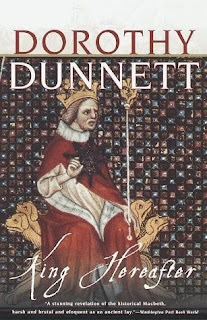Thanks to Shakespeare, the historical MacBeth, King of Scots has been much maligned as a bad actor. From my research for my novel The Refuge, set in 11th century Scotland, I knew Shakespeare got it wrong. In King Hereafter, Dorothy Dunnett brings us into the wild, half-pagan country of Scotland in those early days.
MacBeth begins as an ungainly young Earl Thorfinn with a lowering brow and a taste for intrigue. He calls himself Thorfinn but his Christian name is MacBeth. (Dunnett equates the historical MacBeth with Thorfinn Sigurdsson, Earl of Orkney, whose sons, Paul and Erlend ruled jointly for many years after their father’s death.)
Dunnett shows us MacBeth’s transformation from an angry, fatherless boy who refuses to accept his meager share of Orkney to an accomplished warrior and diplomat who wisely joins with King Canute and Queen Emma to become a respected leader of men.
His wife, Groa (who is made the same woman as the historical Ingibiorg Finnsdottir, wife of Earl Thorfin of Orkney), is a wonderful character who you will come to love. With the people of Alba and Groa behind him, Thorfinn becomes King of Scots. His heart is still in Orkney but he has a new concern for Alba, even going to Rome to see the Pope about clerics for Alba.
This is very much a love story, a romance even though rich in history. The ending is bittersweet and very well done. I felt rather melancholy after reading the last page.
If you would like to experience the court of King Malcolm III, the King of Scots who followed MacBeth, consider my novel, The Refuge, winner of the Illumination Gold Medal Award.


No comments:
Post a Comment